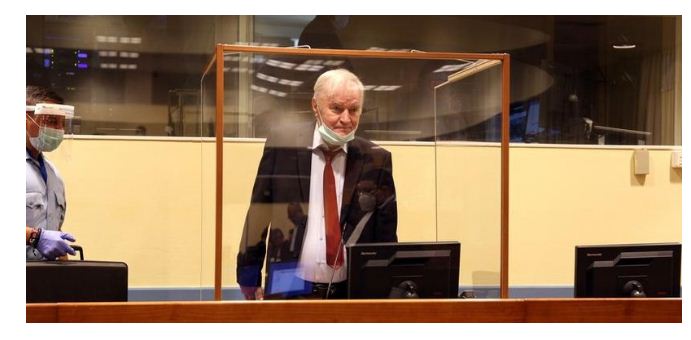UN court in Hague upholds 2017 life sentence for Serbian General Ratko Mladic over Bosnian genocide, war crimes

UN court in The Hague on Tuesday upheld a 2017 life sentence for former Serb commander Ratko Mladic for his role in the genocide in Bosnia and Herzegovina.
The hearing began after it was delayed several times due to Mladic’s health issues and the coronavirus pandemic.
The 78-year-old led forces during the massacre of Bosnian Muslims (Bosniaks) during the 1990s Bosnian War.
He was also found to have had “significant responsibility” for the genocide of over 8,000 Muslim men and boys committed at Srebrenica in 1995.
In 2017, judges for the International Criminal Tribunal for the Former Yugoslavia (ICTY) sitting in The Hague unanimously found Mladic guilty of culpability in the Srebrenica murders, which took place towards the end of the country’s brutal three-year civil war.
‘BUTCHER OF BOSNIA’
Mladic was once Europe’s most wanted man after his role in the 1992-1995 Bosnian War.
He was commander of the Army of Republika Srpska, which was established in Bosnia-Herzegovina at the beginning of the country’s civil war amid the breakup of Yugoslavia.
However, Mladic is also known for his forces’ bloody 1,425-day siege of Sarajevo, the longest of a capital city in the history of modern warfare.
After the end of the war with the Dayton Accords of Nov. 21, 1995, Mladic became a fugitive for over a decade.
A 15-year manhunt ended in 2011 when Mladic was found and handed over to The Hague tribunal for trial.
Mladic’s trial began on May 16, 2012 and ended with summations in December 2016.
The more-than-500-day trial called 591 witnesses and saw nearly 10,000 pieces of evidence accepted by the court.
FUGITIVE FACED JUSTICE
Mladic was born on March 12, 1942 in the Kalinovik area of Bosnia-Herzegovina.
The VRS was founded at the beginning of the war in Bosnia, on May 12, 1992, and Mladic was its commander. JNA forces in Bosnia were also converted to VRS units.
After the end of the war with the 1995 Dayton Accords, Mladic became a fugitive for over a decade before his capture and trial from 2012 to 2016.
Related News

Tehran plays down reported Israeli attacks
Iranian media and officials described a small number of explosions, which they said resulted fromRead More

The largest halal fair in Russia will open on 14 MAY
ISLAMABAD, /DNA/ – More than 40 thousand visitors and 4.5 thousand goods according to HalalRead More


Comments are Closed